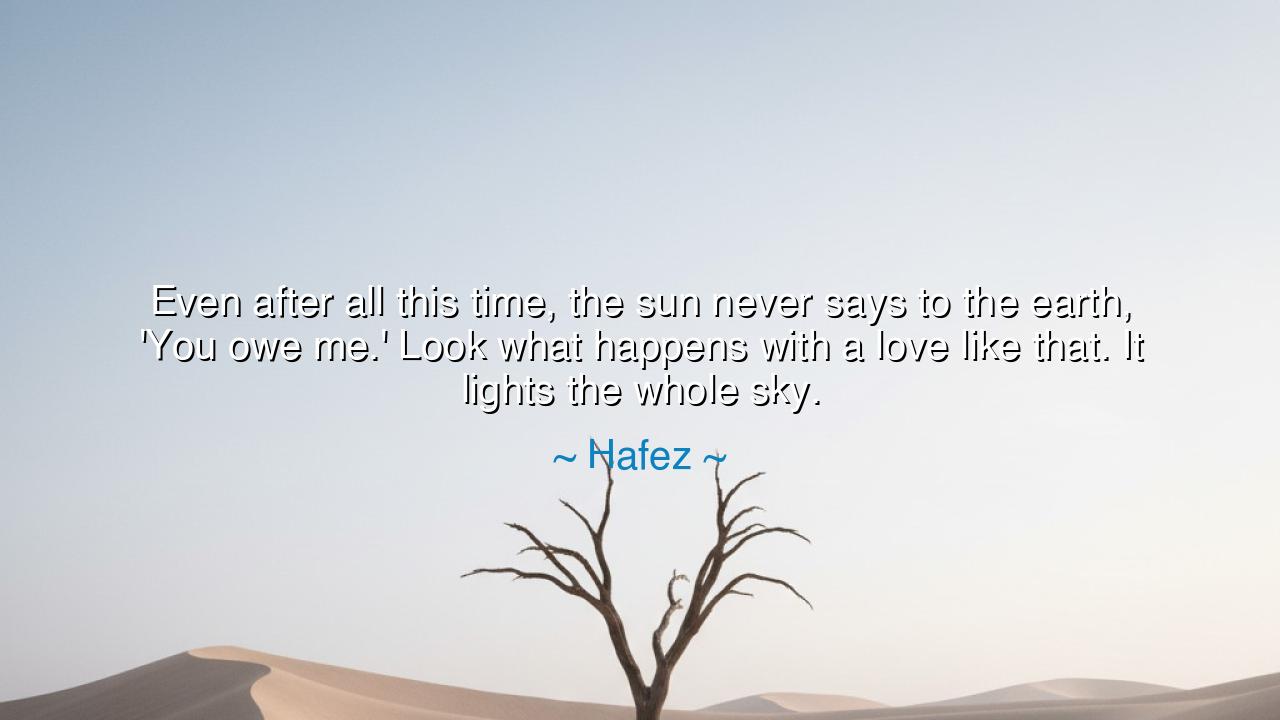
Even after all this time, the sun never says to the earth, 'You
Even after all this time, the sun never says to the earth, 'You owe me.' Look what happens with a love like that. It lights the whole sky.






“Even after all this time, the sun never says to the earth, ‘You owe me.’ Look what happens with a love like that. It lights the whole sky.” Thus spoke Hafez, the mystic poet of Persia, whose words shine with the same light he describes. In this simple image of sun and earth lies a revelation vast enough to embrace all of humanity — the secret of unconditional love, the kind that gives without asking, that burns without bitterness, that sustains without demand. Hafez, like the prophets and sages before him, understood that true love does not measure or bargain. It is grace, endless and unearned, the divine flame that nourishes life itself.
The sun, in its celestial majesty, gives freely — light, warmth, and life to all beings. It asks nothing in return. The earth, humble and silent, receives this gift, and through it, brings forth forests, rivers, and fields of gold. Their relationship is a cosmic mirror of the sacred truth that all creation is held together not by transaction, but by generosity. Hafez saw this in the heavens, and in it, he beheld the reflection of God’s love, which pours itself out upon the unworthy and the worthy alike. “Look what happens with a love like that,” he says — behold the dawn, the glow of evening, the blooming of the world. This is what happens when love is given without condition: it lights the whole sky.
The origin of such wisdom comes from the Sufi tradition, where poets like Hafez and Rumi taught that the soul’s highest purpose is to reflect divine love — not the love that demands or trades, but the love that simply is. For the Sufis, the sun was more than a star; it was a symbol of the Beloved, of God’s boundless compassion, which shines on all, even those who do not see it. They believed that every act of true love — between friends, between parent and child, between lovers — is a shadow of that divine radiance. And so Hafez’s poem becomes both a description of the world and a spiritual command: Love like the sun — selflessly, continuously, joyfully.
Consider, then, the story of Mother Teresa, who walked through the streets of Calcutta tending to the sick, the dying, and the forgotten. She did not ask gratitude, nor seek recognition. She once said, “We can do no great things, only small things with great love.” Like the sun, she gave because giving was her nature, not her duty. The light of her compassion reached across the world — just as Hafez foretold — for “a love like that lights the whole sky.” It is the kind of love that transforms pain into peace, despair into hope, darkness into dawn.
In this, Hafez teaches the profound distinction between conditional and unconditional love. Conditional love says, “I give if you deserve it.” It is a marketplace of emotions, always tallying debt. But unconditional love says, “I give because I must, because my nature is love itself.” The sun does not check who has worshiped it before it rises; it does not withhold its light from those who curse the day. It shines simply because that is what it was created to do. Likewise, when the human heart awakens to its divine nature, it becomes a sun unto others — radiating kindness, forgiveness, and joy without expectation.
Yet to love in this way is not easy. The world often teaches us to guard our hearts, to love only where it is safe, to demand payment for our care. But such love, like a candle in the wind, cannot light the sky. Hafez calls us to something higher — to love without fear of loss, to give without counting the cost, to trust that what we give freely will return in forms unseen. For love, when hoarded, fades; when shared, it multiplies. The more it shines, the brighter it becomes.
Therefore, let this be the lesson to all who hear: Be as the sun. Give warmth even to those who offer you none. Shine upon both the grateful and the ungrateful. Do not love for what you might gain, but for what love itself makes of you — radiant, generous, alive. And if ever your heart grows weary, look to the sky at dawn, and remember: the sun has risen again, not because it is owed, but because it cannot do otherwise. So, too, must we rise each day in love — unasked, unthanked, and unafraid.
For when humanity learns to love as the sun loves, to give as freely as the heavens give light, then indeed, as Hafez proclaimed, the whole sky will shine — not only above us, but within us. And that brilliance, born of selfless love, will outlast the stars themselves.






AAdministratorAdministrator
Welcome, honored guests. Please leave a comment, we will respond soon